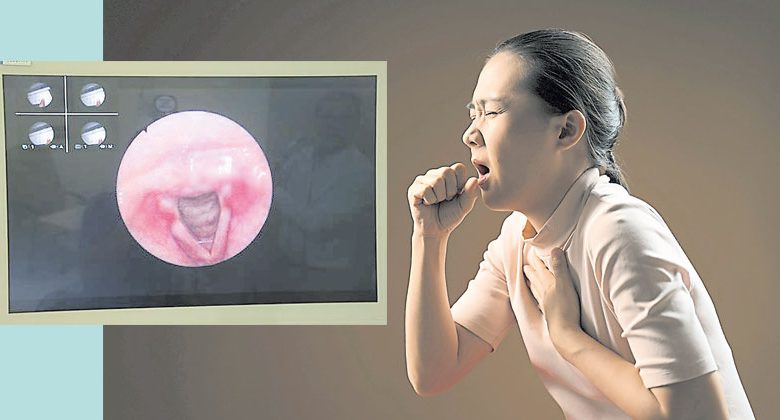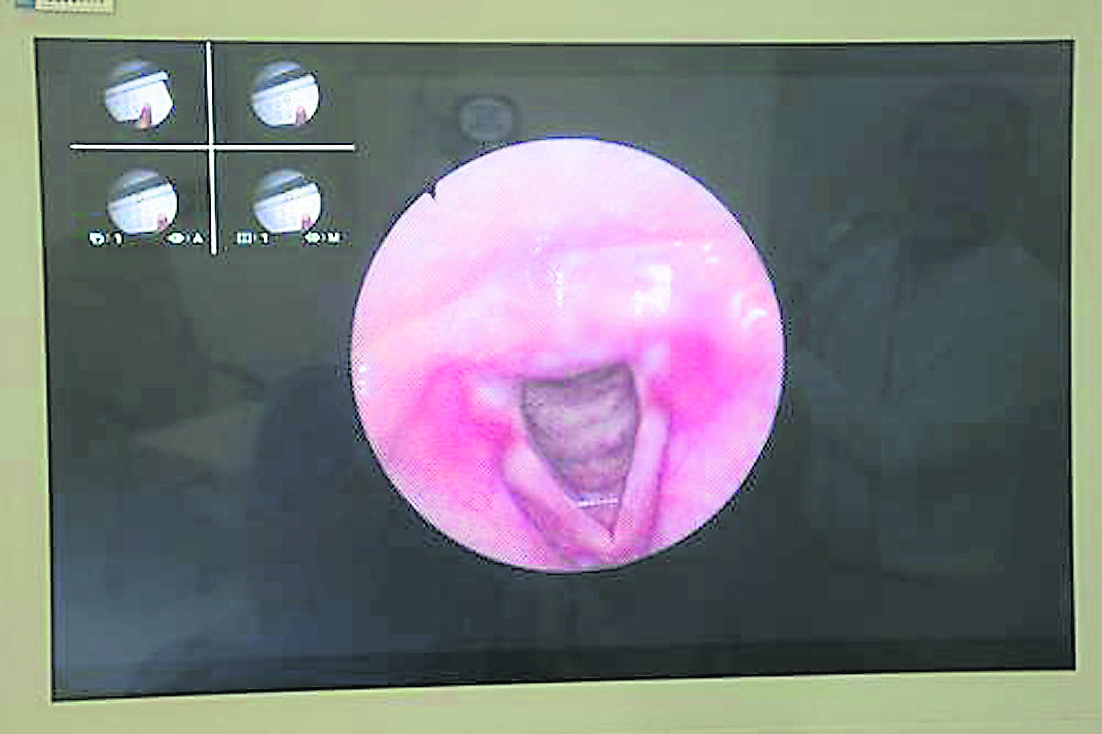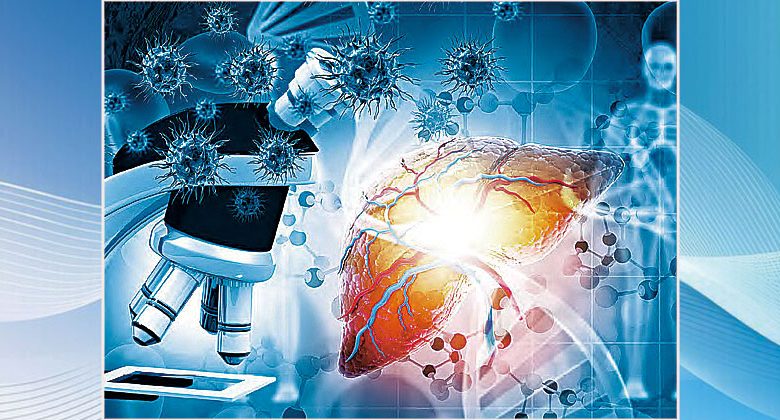【Local Medical】Cough, phlegm, difficulty swallowing, throat reflux, beware of cancer

Text: Chen Xiaoquan Organizer: Liang Yingxiu
Atypical symptoms caused by gastroesophageal reflux include cough, throat jam, and often clear phlegm, etc., because gastric acid refluxes to the vocal cords or trachea and cannot be discharged.
It is clinically called “reflux pharyngitis”, and it is also a kind of “headache” for doctors, because it is not only difficult to treat, but also the effect of drugs is not good.
Dr. Chen Chuangu
(Dr Raymond Tan Suan Kuo)
(Kuala Lumpur) Laryngopharyngeal Reflux (LPR) refers to the symptoms caused by gastric acid retrograde into the throat. Typical symptoms of LPR include hoarseness, foreign body sensation in the throat, mild difficulty swallowing, chronic cough, repeated throat clearing, etc. Severe cases may cause unexplained weight loss, swollen lymph nodes, easy fatigue and difficulty swallowing.
Foreign body in throat but still able to eat
Dr Raymond Tan Suan Kuo, Consultant of Otorhinolaryngology and Head and Neck Surgery, said that patients will feel that there is a foreign body in the throat for no reason, and there is always a feeling that it cannot be cleared when trying to swallow. These symptoms are called globus pharyngeus ).
“We all know that gastric acid is composed of hydrochloric acid, potassium chloride, and sodium chloride, and its pH value is 1.5 to 3, but it should not appear in the esophagus. The current esophagus As the pressure between the Lower Esophageal Sphincter (LES) and the stomach gradually weakens, gastric acid will flow back and attack the esophagus, causing inflammation of the esophagus and throat, and even extending to the sinuses, causing sinusitis or otitis media.”
Gastric acid invades the esophagus and causes throat reflux, resulting in redness and inflammation of the throat.
Once the esophageal cells have pathological changes,
Will induce Barrett’s esophagus (Barrett’s esophagus).
Patients with Barrett’s esophagus have a 10% chance of developing esophageal cancer,
Therefore, throat reflux is the cause of esophageal cancer.
He pointed out that when patients feel that there is a foreign object in their throat, they are afraid that they will have cancer, especially laryngeal cancer. eat. Doctors will also use flexible nasopharyngoscopy to diagnose acid reflux in the throat and stomach to rule out the possibility of laryngeal cancer.
“After endoscopic examination, if the throat of a patient with laryngopharyngeal reflux is very swollen from being burned by gastric acid, the doctor will use gastric acid-suppressing drugs to control the condition for 2 to 4 weeks.”
There are 3 types of medications used to treat reflux:
The first / there are potassium ion competitive gastric acid blocker (Potassium Competitive Acid Blocker, P-CAB), proton pump inhibitor (proton-pump inhibitor), histamine blocker (H2 blockers), this drug is used to Suppresses stomach acid.
The second type is gastrointestinal motility promoters (prokinetic agents), which can help patients enhance intestinal motility and promote digestion.
The third type is antacids, which are used to neutralize excessive gastric acid secretion.
He said, generally, I give patients the first drug first, and the second and third drugs depend on the condition of the patient. I would like to emphasize that although these drugs have no dangerous side effects and can be purchased in pharmacies, do not become a doctor yourself and think that these drugs are suitable for you. You must ask a doctor for diagnosis before buying drugs.
Less than 0.5% of patients require surgery
However, patients who do not respond to medical therapy may be due in part to weakness of the lower esophageal sphincter or a diaphragmatic hernia (hiatus hernia). These patients require Nissen’s fundoplication to improve acid reflux symptoms.
“This procedure is the specialty of gastroenterologists, who also refer patients to gastroenterology. These cases are very rare, less than 0.5% of patients with laryngopharyngeal reflux require this procedure.”


Smoker and drinkerhigh risk love to eat SOSpay attention
Many people confuse laryngopharyngeal reflux with acid reflux, because the symptoms are caused by stomach acid problems. The former is caused by stomach acid causing phlegm and discomfort in the throat, while the latter is caused by a burning sensation in the patient’s chest and non-stop hiccups during meals.
Chen Chuangu said that men are more likely to suffer from throat reflux than women, especially smokers, alcoholics, and those who like to eat “SOS”, that is, spicy (Spicy), greasy (Oil) and sour (Sour) food, and Malaysian cuisine is far from Do not open these 3 kinds.
suggest earlyhave supper
“Patients with reflux like to eat irritating or acidic foods, such as peppers, raw mangoes, sour kiwis, sour plums, etc., and also prefer to eat high-fat foods. Among them, patients also have the habit of drinking coffee, tea and alcohol. Tea and alcohol It can increase gastric acid secretion, and some people who eat too much chocolate can also have stomach acid problems.”
In addition, each full meal may cause stomach acid to rush out. He also recommends an early dinner to prevent acid reflux. It is best for patients to quit smoking and eat less food that stimulates gastric acid secretion, especially spicy ones. They should also reduce drinking alcohol, coffee, tea, and chocolate. They also need to change meal times. Do not eat 3 hours before going to bed, and do not eat too late Eat or eat and sleep.
“Going to sleep immediately after a meal will slow down gastrointestinal motility and reduce gastric acid secretion, which will easily lead to incomplete digestion and absorption of food, and the pressure in the stomach will increase after eating. If you lie down immediately, it will increase gastroesophageal reflux. chance.” He advises not lying down for at least an hour after a meal, or else propping up a pillow to avoid acid reflux.
only after mealeat vitamin c
Many people order hot and spicy soup base when they eat hot pot. However, if it is too spicy, it will easily stimulate the esophagus and stomach to secrete too much gastric acid, and induce throat reflux.
In addition, patients should also avoid wearing tight clothing, which will directly compress the digestive system, especially the connecting pipe between the stomach and esophagus, which will cause gastric acid to rush upward after being stimulated, and damage the esophageal mucosa.
“Some people will habitually supplement vitamin C, but vitamin C is acidic. Excessive intake will stimulate gastric acid secretion and cause acid reflux. Therefore, for patients with gastric acid problems, doctors recommend taking vitamin C after meals.”
When some people face stress, their stomachs will become tense and produce stomach acid. Therefore, these people need to find ways to reduce pressure and relax to avoid increasing the burden on the stomach.
He pointed out that Chinese are more prone to esophageal cancer, because Chinese like to “eat while it’s hot” and gobble it up, causing double damage to the throat, so esophageal cancer is still one of the top 10 cancers in Malaysia.
“The development and spread of esophageal cancer is quite fast, and an average of 3 to 6 months is enough to kill. Therefore, prevention is still the most important.”

![[Love Wants Sexual Happiness Series 358]Find the culprit and overcome psychogenic erectile dysfunction. Don’t let pressure affect your sexual happiness. [Love Wants Sexual Happiness Series 358]Find the culprit and overcome psychogenic erectile dysfunction. Don’t let pressure affect your sexual happiness.](https://webcdn.guangming.com.my/wp-content/uploads/2024/04/171111-780x420.jpg)

![[Wanqingyi Care]My health, my rights, customized medical methods in the last stage of life [Wanqingyi Care]My health, my rights, customized medical methods in the last stage of life](https://webcdn.guangming.com.my/wp-content/uploads/2024/04/ZZ1-100-780x420.jpg)
![[Kidney Transplantation Special Topic]The survival rate of transplanted kidneys is high without dialysis treatment three times a week [Kidney Transplantation Special Topic]The survival rate of transplanted kidneys is high without dialysis treatment three times a week](https://webcdn.guangming.com.my/wp-content/uploads/2024/04/1311-780x420.jpg)



